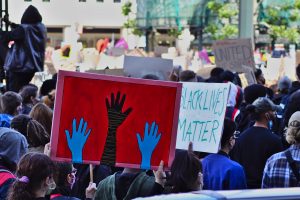Hearts, Minds, Institutions: Dismantling Racism in America

Americans have had to face an old question with new urgency: “How do we fix racism?” Among the solutions, some observers have focused on the challenge of changing “hearts and minds”, but historically progress in that regard has proven fitful, and quantifying success is difficult. The slow process of converting racists to non-racists or less-racists also puts black people in the position of waiting for white people to mend, or not mend, their prejudiced attitudes. It places them in the back of the bus, one might say, while whites continue to drive toward whatever destination they ultimately see fit.
The second answer to the question is structural – taking action to dismantle institutionalized racism. We can wait forever for white folks to gain compassion and to surrender their tribal view of humanity, but we can no longer wait to take apart the system that has always relegated African-Americans to lesser status in our society and subjected them to unrelenting violence, both physical and spiritual. Clearly policing is a key issue. We must rethink the role of police in America and how as an institution it has always been used to oppress the black minority and to protect the property (i.e. wealth) and power of whites.
Communities of color, be it in Ferguson, Missouri, New York or elsewhere, are systematically taxed with disproportionate arrests, summonses and fines, with the money collected going to further fund the police – a vicious cycle that must be interrupted to attack systemic racism. See the documentary Crime + Punishment for more on the New York context; it shows how police officers there routinely round up young people of color to meet arrest and summons quotas.
Another major issue is mass incarceration (and the related deprivation of voting rights of felons post release). Sentencing disparities for equivalent crimes (whites and powder cocaine possession vs blacks and crack cocaine possession) have been well documented. And according to a 2017 University of Michigan Law Review study, “Innocent black people are about seven times more likely to be convicted of murder than innocent white people.” For more, see Ava DuVernay’s documentary 13th, which draws a straight line between the passage of the 13th Amendment to the U.S. Constitution in 1865 that formally abolished slavery and the system of mass incarceration of African-Americans that took its place.
Addressing past injustices is likewise important – for instance, redlining in real estate that prevented black people from buying property in largely white areas (example: the “model” planned community of Levittown, New York), systematically denying them the opportunity to build wealth through homeownership. The documentary Charm City explores this in the context of Baltimore, where African-Americans have been effectively segregated into poorer neighborhoods with fewer services than in white neighborhoods.
Institutionalized racism permeates so many areas of American life – in taxation policy that favors inherited wealth and furthers wealth inequality; in education policy where local school systems are funded through property taxes, with the result that schools in minority areas are massively underfunded compared to wealthier, whiter school districts; in health care where people of color are denied the level of access and standard of care afforded to whites. This is just the start. Attacking the structures that allow racism to fester and perpetuate injustice is the most crucial task, as we wait for white “hearts and minds” to evolve.
Matthew Carey
Matthew Carey is the founder and editor of the documentary news site nonfictionfilm.com. His coverage of documentary film also appears regularly on Deadline.com and Documentary.org. He is based in Los Angeles.

